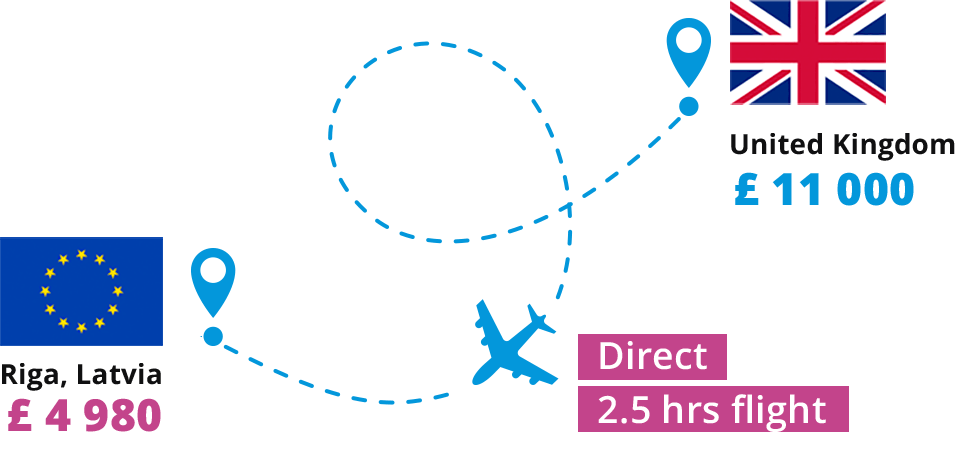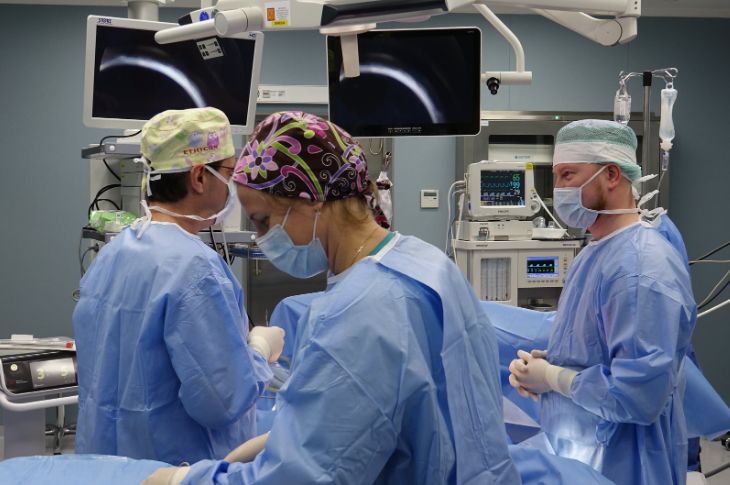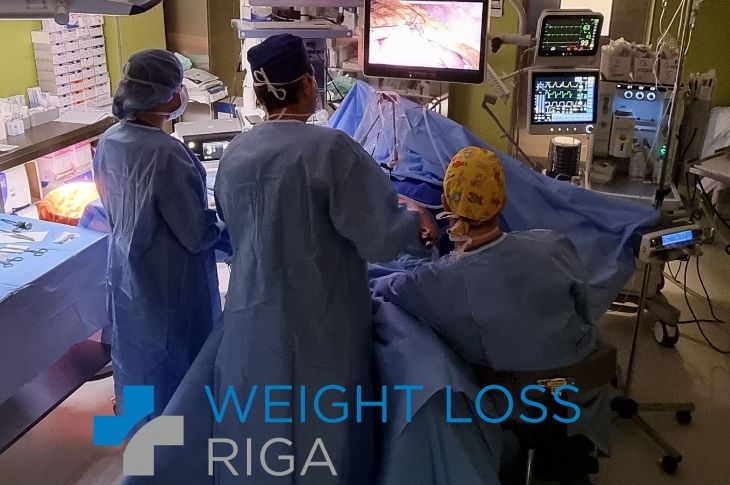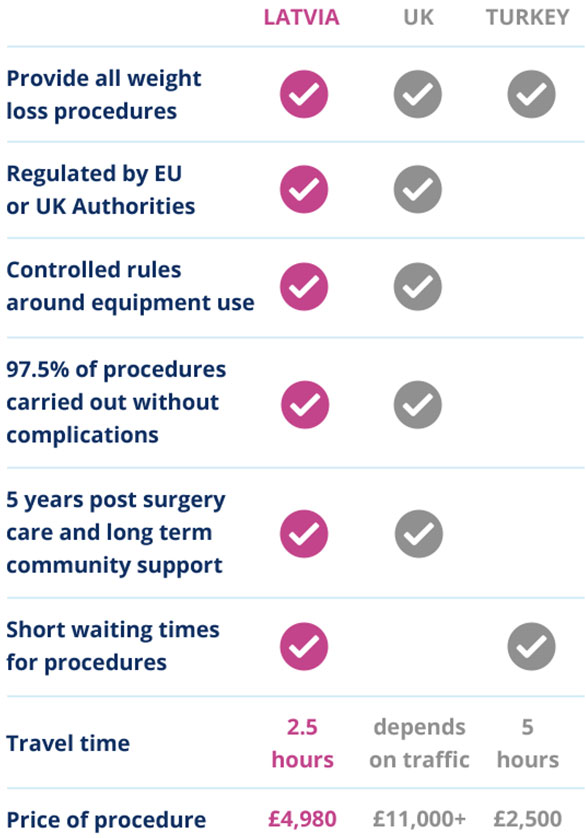- Category: Articles About Weight Loss Procedures

For the most part, healthcare services provided through the NHS have historically been, and still are, excellent. In fact, you would be hard-pressed to find anyone who could make a contrary argument.
However, what is not so excellent is the ordeal of getting approval for your bariatric surgery from the NHS, since the process involves first going to your GP, getting them to sign you on, applying to your local Primary Care Trust (PCT) for approval of your surgery (which could take months) and then – if you have been approved and if the PCT did not add any stipulations – getting on the NHS weight loss surgery waiting list.
Can You Get A Gastric Band On The NHS?
Many individuals might ask “Can I get a gastric band on the NHS?”, a question frequently posed to GPs and searched online. The answer is yes but with some considerations. While it's rare to be approved for an NHS gastric band, it is possible. However, the gastric band is becoming increasingly unpopular due to its risks and the intensive follow-up care required. These regular adjustments add significant time and cost burdens to the NHS. Moreover, there's a notable rate of aftercare failures with gastric bands, leading to a shift in preference towards other weight loss surgeries like gastric bypass.
With that being said, certain clinics abroad, such as Weight Loss Riga in Latvia, are gaining attention for offering reversal surgeries for NHS gastric bands. These international options are particularly appealing for those looking to avoid the complexities and wait times associated with NHS gastric band removal criteria in the UK. Additionally, these clinics often present a more cost-effective alternative to private surgery in the UK, making them an attractive option for individuals seeking to reverse their gastric band procedures without the high expense and stress commonly associated with such surgeries in their home country. So, if you’re an individual who’s undergone a gastric band and you’re asking yourself “can I get my gastric band removed on the NHS?” A smarter option might be to seek your revision surgery abroad.
How to Get Weight Loss Surgery on the NHS
Before your PCT can even consider your request you will need to meet certain weight loss surgery NHS criteria. While these criteria can vary from location to location, in the UK the National Institute for Health and Care Excellence (NICE) guidelines recommend free weight loss surgery on the NHS could be approved if:
- You have a BMI (Body Mass Index) over 40 or a BMI of 35 to 40 with other serious conditions that would likely improve if you had this type of surgery.
- You have tried repeatedly to lose weight using other methods but have been unsuccessful.
- You are willing to commit to a long-term program of healthy eating and other lifestyle changes.
- Your level of overall fitness is sufficient to undergo surgery and endure general anesthesia.
- You have been or are willing to receive treatment from a team of obesity specialists.
- Or your Body Mass Index is over 50.
If you currently suffer from Type 2 diabetes and are of South Asian descent in particular, bariatric surgery NHS guidelines allow you to be considered for surgery even if your Body Mass Index is below the standard threshold of 35.
But, although NICE has fought to gain more free surgeries for Type 2 diabetes patients, the reality is that most people who request bariatric surgery will not be approved. The lucky few who manage to pass through the tight sieve could wait 18+ months.
CONSIDERING AFFORDABLE PRIVATE WEIGHT LOSS SURGERY? SPEAK TO A PATIENT COORDINATOR
CONSIDERING AFFORDABLE PRIVATE WEIGHT LOSS SURGERY? SPEAK TO A PATIENT COORDINATOR
Bariatric Surgery NHS Funding: The Approval Process
If you believe you qualify for NHS funding for your weight loss surgery, you will need to pay a visit to your GP and ask them to provide you with a referral to get the process started. If you are uncertain exactly what the referral criteria are for your local PCT, do an Internet search for “PCT” plus your location to find the website of your local PCT. They will have the criteria for bariatric surgery on the NHS there for you to see. Or you can go to the website of your local Patient Advice and Liaison Service (PALS). In addition, these websites will have information that will help you clarify the referral process in the unlikely event your GP is uncertain how to proceed.
The bottom line is that bariatric surgery NHS waiting times vary because all PCTs are slightly different in the way they handle referrals. In some cases they will require a referral to a weight management service before they will approve funding, others will require the referral to come from a surgeon, and still others will insist the referral come from a bariatric coordinator.
The amount of time involved from your initial consultation with a GP to actual surgery (provided you are approved by the PCT panel) can range from 2 months to more than 2 years. There is simply no way to predict it with any accuracy.
It’s important to note that even if you do get approved for weight loss surgery on the NHS, the process can become much more complicated when it comes to seeking your surgery abroad. This is why many Brits are going straight to European clinics instead of through the NHS, as the journey is often much smoother from start to finish, and is usually much more affordable than in the UK. Seeking your weight loss surgery abroad can cut out difficult application processes and allow you to focus on your weight loss journey.
Why Are The Waiting Times So Long on the NHS?
The waiting list is unpredictable to measure and could be anything between 3-48 months. The major causes for this are:
- A large number of candidates
- Ever low amount of funding, although both the government and NICE along with NHS seek to raise it annually
- The low position of bariatric surgery in the NHS's priority list – this is by no means the fault of the NHS, the choices made here are simply impossible and any shifts would take enormous extra funds directed straight at Tier 4.
A popular alternative to waiting is taking up gastric sleeve surgery abroad.
Can I Get Weight Loss Surgery on the NHS if I Go Abroad?
When considering weight loss surgery abroad, it's essential to be aware that securing funding from the NHS for such treatments and then traveling overseas can be a complex process. While it is possible, it requires careful navigation of various procedures and eligibility criteria. Failure to follow the correct steps may result in having to bear the full financial burden of your treatment. To begin, discussing your plans with a GP is crucial before making any final decisions regarding travel and medical arrangements.
It's important to note that your European Health Insurance Card (EHIC) or UK Global Health Insurance Card (GHIC) does not cover planned medical treatments abroad. These cards are designed for necessary healthcare in EU countries and Switzerland, defined as care that becomes medically essential during your stay and cannot reasonably wait until your return to the UK.
The post-Brexit landscape has altered access to treatment in Europe, and funding options now depend on specific routes and eligibility criteria. The S2 funding route involves a direct arrangement between the NHS and the healthcare provider in your chosen country, but some nations may still require you to contribute to the costs. For this route, prior authorization from NHS England is necessary. Alternatively, the EU directive route entails upfront payment for treatment abroad, with eligible costs claimed from the NHS upon your return. We’ll discuss these funding processes in more detail further in this article.
HOW LATVIA COMPARES

HOW LATVIA COMPARES

Included in your treatment

Are NHS Funding Routes Available to Everyone?
Although there are funding processes available, the options for UK patients are limited. Let’s look at the two possible funding routes we mentioned earlier.
S2 Funding Route
The Planned Treatment Scheme, also known as the S2 funding route, offers a pathway for eligible British residents to receive NHS funding for planned state healthcare treatments in EU countries, Switzerland, Norway, Iceland, or Liechtenstein. However, it's crucial to understand that this scheme only applies to public healthcare providers and does not cover private treatment. This means that although it provides an avenue for how to get a gastric band on the NHS abroad, it cannot be utilized for surgeries at private clinics.
To be eligible for S2 funding, several criteria must be met, including prior approval of the application, the necessity for the treatment to be part of the state healthcare scheme of the providing country (not as a private patient), and the treatment being routinely available under the NHS in the patient's medical circumstances. Additionally, the NHS must confirm the inability to provide the specified treatment within a medically acceptable timeframe, a condition referred to as 'undue delay'. The patient must be ordinarily resident in England, entitled to NHS treatment, and registered with an NHS GP.
It's important for patients to verify that the healthcare provider in the EU or associated countries will accept the S2 form and that they are offering the treatment through state-funded healthcare. S2 funding cannot be considered for clinical trials or experimental parts of any treatment package, and patients should not have to pay for eligible treatment costs, apart from any co-payment.
While this scheme offers an alternative to private surgery or the NHS application process within the UK, it's limited to state-provided treatments and does not encompass private healthcare options. This limitation means that not everyone seeking weight loss surgery abroad can utilize NHS funding, especially those looking for private clinic services, which are often perceived as providing superior care.
EU Directive Route
Prior to the UK's departure from the EU, the EU Directive route provided a means for individuals to receive treatments in another European Economic Area (EEA) country (excluding Switzerland) and then apply for reimbursement of the costs from their home healthcare system. This route covered both state-funded and private planned care, as well as emergency treatments. While routine treatments were generally included, specialised treatments required prior approval.
Under the EU Directive, individuals could seek reimbursement for any treatment they had undergone, up to the cost of the same or equivalent treatment within their own national healthcare system. However, with the UK's exit from the EU, this funding option is no longer available for current or future treatments. The end of the EU Directive route in the UK means that new applications for reimbursement under this scheme are not accepted.
There are, however, some legacy arrangements in place. These apply only if the treatment began or was completed before 31 December 2020 (and did not require prior approval as it was not a specialised treatment), or if a funding application for specialised treatment was submitted before this date but the decision was not received until after. Additionally, if there was prior approval for a specialised treatment before 31 December 2020, but the treatment had not started by that date, it may still be eligible for reimbursement.
Treatment after 31 December 2021, marking the end of the transition period, is generally not eligible for reimbursement, with the exception of cases involving exceptional circumstances, such as delays due to COVID-19, which are considered on an individual basis.
In summary, while the EU Directive route once offered a broader scope for funding treatments, including those at private facilities in the EEA, its applicability is now limited to certain legacy cases due to the UK's exit from the EU.
NHS Gastric Band Criteria: Is It Worth It?
With all this in mind, it’s clear why so many Brits are seeking private clinics abroad for their weight loss surgery. Given that there are so many complexities involved in applying for weight loss surgery through the NHS, with little reassurance that they’ll be accepted for treatment, going abroad may not only be more affordable but also simpler and less stressful for the patient.
With the decrease in popularity of the gastric band, it’s recommended to seek alternative forms of bariatric surgeries in Europe, such as gastric bypass. Choosing to have your weight loss surgery in Europe, especially in Eastern European countries, means short and easy travel, and compared to the UK private clinics, much cheaper and faster service with infallible quality.
In our clinic, for example, we don’t just take care of you throughout the entire process of surgery, but also aid you with another post-operation problem – the excess skin after weight loss surgery. When funding loose skin after weight loss through the NHS isn’t possible, we offer affordable solutions, all carried out by expert and knowledgeable surgeons.
The Necessity of Plastic Surgery After Bariatric Procedures

Photo: Weightlossriga.co.uk
The relationship between weight loss surgery and plastic surgery is quite distinct yet interconnected. On one hand, weight loss surgery, also known as bariatric surgery, is effective for rapid and sustainable weight loss, provided patients strictly adhere to post-operative guidelines. However, this rapid weight loss often leads to another concern: excess, sagging skin. Common areas affected include the neck, upper arms, face, buttocks, breasts, abdomen, and thighs. This excess skin can be uncomfortable and aesthetically displeasing for patients.
This is where plastic surgery, or body contouring surgery, becomes relevant. It offers a solution to these post-bariatric surgery challenges by removing excess skin, thereby improving the overall appearance and comfort of the patient. It's important to note that while weight loss surgery is focused on health improvement and weight reduction, plastic surgery addresses the aesthetic concerns that may follow significant weight loss.
Moreover, even with the skill of the surgeon, there can be visible scars from weight loss surgery. Patients often seek plastic surgery not only for skin tightening but also to conceal these scars as much as possible. In summary, plastic surgery can play a crucial role in the complete transformation journey after bariatric surgery, helping patients feel more comfortable and confident in their new bodies.
Loose Skin Removal NHS: Is It Possible?
NHS funding for cosmetic surgery is limited and not routinely provided. It’s rare that a patient will receive a full-body lift on the NHS after weight loss surgery. The general policy is that cosmetic or plastic surgery on the NHS is primarily considered for reconstructive purposes rather than for aesthetic enhancement. This means that the main goal of such surgeries is to restore function and appearance to tissue and skin that is missing or damaged, often due to illness, accident, or congenital defects. This means that skin removal surgery after weight loss on the NHS may not be possible.
The decision to fund such surgeries is determined by local integrated care boards and involves a comprehensive clinical assessment, which may include evaluations by a general practitioner, a plastic surgeon, and possibly a psychiatrist or psychologist. The availability of these services can vary geographically, and in some cases, patient assessments are carried out to measure the impact of the surgery on the patient's quality of life.
To apply for NHS funding for plastic surgery abroad, you need to follow a specific process, which primarily involves the two main funding routes mentioned earlier: the S2 route and the EU Directive route. However, the only way you might be approved is to seek state surgery, where you may not receive care that’s as personalised as it would be at a private clinic.
With the many hurdles involved in the application process for NHS skin removal after weight loss, many patients find it easier to have their plastic surgery abroad. Taking this route offers reassurance for the patient as well as cutting costs, as European clinics are usually much more affordable than private clinics in the UK.
Perhaps the most popular country for people seeking weight loss surgeries abroad is Latvia. This is because of its growing reputation for renowned clinics and world-class surgeons. Our Clinic in particular, Weight Loss Riga, is a shining example of Latvia’s reputation.
Should You Simply Go Ahead and Have Your Surgery in Latvia or Wait for the NHS?
Picture this scenario: You're struggling with severe obesity, and all your efforts at dieting have been unsuccessful. You're experiencing dangerous fluctuations in your blood sugar levels, and severe sleep apnea is disrupting your life and causing deep concern, reminiscent of the tragic case of Carrie Fisher. Additionally, the extra weight is taking a toll on your knees and ankles, and you're suffering from soft tissue infections due to skin friction. It's a dire situation, and you're desperately seeking a solution.
You've heard about the possibility of undergoing bariatric surgery through the NHS. However, the journey to getting this surgery is not straightforward. Firstly, the PTC needs to approve your case, which itself might take several months. Even after approval, the actual wait time for the surgery could extend up to 18 weeks. Moreover, the PTC might identify other health issues that need to be addressed before you can proceed with the surgery. Consequently, you could be looking at a prolonged wait, possibly spanning 3-4 years or even more, before you're able to undergo weight loss surgery through the NHS in the UK.
A Faster, Better Way
While the option of seeking NHS funding for weight loss surgery abroad through the EU Directive route exists, it's important to consider the potential complexities and uncertainties involved in this process. Gaining approval for such surgeries on the NHS has become increasingly challenging, and even if approved, the NHS typically does not cover additional expenses like flights, transfers, and accommodation.

Photo: Weightlossriga.co.uk
In contrast, opting for a direct approach with a specialised clinic like Weight Loss Riga could offer a more streamlined and potentially quicker solution. Weight Loss Riga, located in Latvia, provides comprehensive packages that include flights, transfers, and accommodation, which are not typically covered by the NHS. This approach can significantly reduce the waiting time for surgery, which could otherwise extend to a year or more when seeking treatment through the NHS.
How reasonable are costs at Weight Loss Riga? Have a look at this comparison chart which shows the price for weight loss surgery in a variety of different European capitals.
Price for gastric bypass in various European cities:


As you can see your out-of-pocket expenses to have the surgery performed at Weight Loss Riga are less than half what the surgery would cost in London or Dublin. Therefore, paying for the procedure yourself is not nearly the financial stretch it would be in the UK.
Although opting for bariatric surgery through the NHS in England ensures a high standard of care, it's important to consider if you're willing to wait up to 4 years for the procedure. Ultimately, the choice is yours. However, keep in mind that you have various options available, and it's worth exploring these before deciding to join the NHS waiting list.







